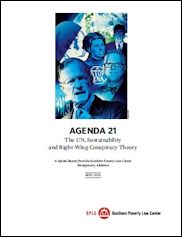Here in Virginia, the anti-Agenda 21 zealots have managed to stay out of the headlines for quite a while. I don’t know if that’s because they are quietly re-energizing themselves or if the movement is falling apart. But it never hurts to be reminded of the bizarre nature of this populist splinter group, which has done so much to obfuscate the issues surrounding growth and development in Virginia and distract from the task of articulating a positive, forward-thinking set of conservative principles to guide governance at the local-government level.
That reminder comes from a new report from the Southern Poverty Law Center, “Agenda 21: the U.N. Sustainability and Right-Wing Conspiracy Theory.” The report documents how the anti-Agenda 21 movement, which regards the Agenda 21 project of the United Nations as a radical environmentalist plot to deprive Americans of their property rights and way of life, has thrived on the paranoid fringe of conservative thought.
Lead author Heidi Beirich documents the spread of anti-Agenda thinking from its fountainhead, Tom DeWeese, head of the American Policy Center in Remington, Va., to the Constitution Party, the Constitutional Sheriffs and Peace Officers Association, the John Birch Society, neo-Nazis and all manner of obscure, grass-roots organizations. Many of these are groups that mainstream conservatives do not want to be associated with. Indeed, many are a downright embarrassment to conservatives, for their ideological affinity for small government allows liberals and progressives to paint the broader small-government movement as a collection of cranks and weirdos.
Nowhere is that dynamic more damaging, however, than the debate over Climate Change, the very issue that animates the anti-Agenda 21 populists, because an inordinate fear of global warming underpins many liberal/progressive initiatives in the realm of transportation, zoning and land use.
In truth, there are legitimate questions relating to how global temperatures are measured and calculated. There are issues regarding how much global warming can be attributed to human activity and regarding the efficacy of the climate-model projections that underpin climate alarmism. There is disagreement over the extent to which global warming will harm humanity and the environment. And then there are questions outside the realm of science regarding how best to respond to the challenge of climate change — re-engineering the modern industrial economy to limit CO2 emissions or simply adapting to change if and when it occurs. But of all the issues that serious people raise about climate change orthodoxy, the existence of an international conspiracy to impose the United Nation’s sustainability/social justice agenda upon the American people is not one of them.
I addressed the flaws in the anti-Agenda 21 thinking (it is too incoherent to dignify with the appellation of a “theory”) two months ago in a white paper, “A Distracting Doctrine.” The anti-Agenda 21 literature is replete with cherry-picked data, leaps of logic and an astonishing lack of awareness of conflicting information. This scatter-shot body of thought is so embarrassingly unpersuasive that it actually harms the cause of other skeptics mounting a serious case against climate alarmism.
Worst of all, the anti-Agenda 21 movement is an immense distraction. Focusing on a supposed conspiracy is a losing proposition: first, because there is no conspiracy and it is difficult to persuade people to believe in something that does not exist; second, because global warming orthodoxy has many demonstrable weaknesses that people should be talking about but aren’t, in part because they’re distracted by Agenda 21; and third, because the anti-Agenda 21 movement offers no solutions to the challenges of local government in the 21st century.
The Agenda 21 contras have nothing useful to say about how Virginia regions and local governments should address the challenges of fiscal stress, congested roads and highways, quality of life, local environmental degradation and other issues affected by our built environment. The liberal/progressive answer, driven by a conviction that climate change is a threat demanding the investment of billions of dollars to reduce CO2 emissions, is to strive for environmental sustainability. As I have argued on this blog, conservatives should hammer on the themes of fiscal responsibility, livability, economic development and local environmental issues like air and water pollution. It’s hard to do that when the anti-Agenda 21 crowd is attracting attention by swatting at figments of their imagination.



